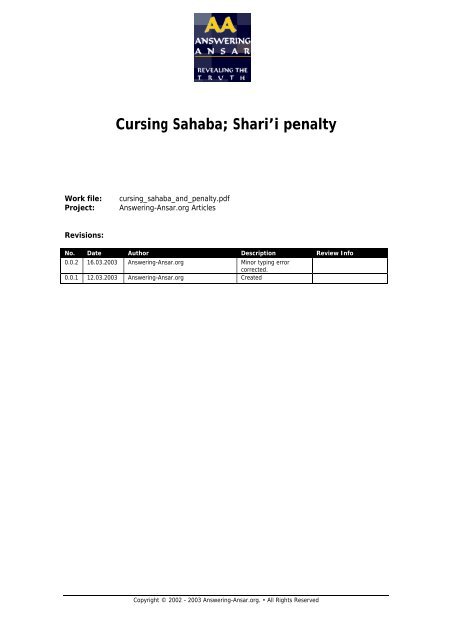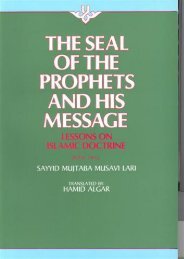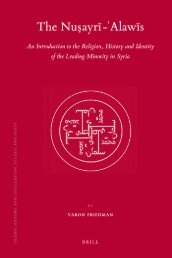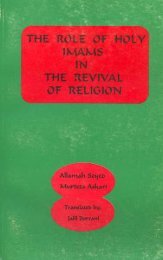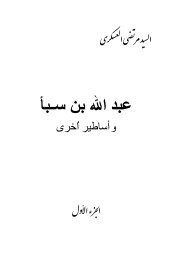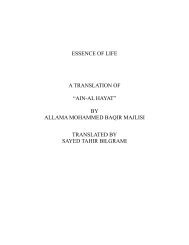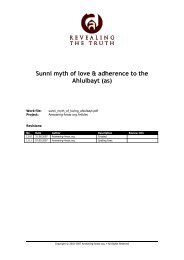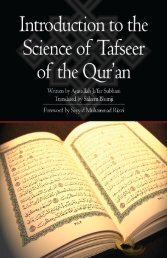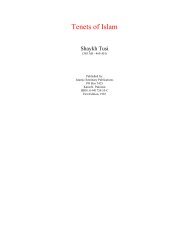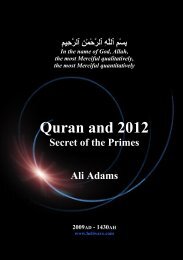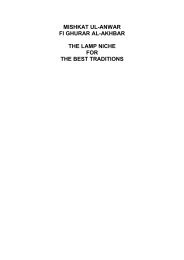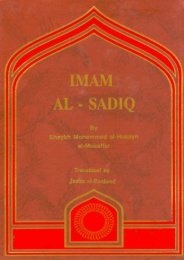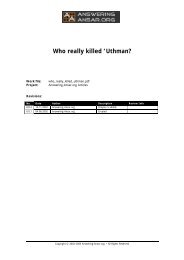Cursing Sahaba Shari’i penalty
Cursing Sahaba; Shari'i penalty - preterhuman.net
Cursing Sahaba; Shari'i penalty - preterhuman.net
- No tags were found...
You also want an ePaper? Increase the reach of your titles
YUMPU automatically turns print PDFs into web optimized ePapers that Google loves.
<strong>Cursing</strong> <strong>Sahaba</strong>; <strong>Shari’i</strong> <strong>penalty</strong><br />
Work file:<br />
Project:<br />
cursing_sahaba_and_<strong>penalty</strong>.pdf<br />
Answering-Ansar.org Articles<br />
Revisions:<br />
No. Date Author Description Review Info<br />
0.0.2 16.03.2003 Answering-Ansar.org Minor typing error<br />
corrected.<br />
0.0.1 12.03.2003 Answering-Ansar.org Created<br />
Copyright © 2002 - 2003 Answering-Ansar.org. • All Rights Reserved
Page 2 of 29<br />
Contents<br />
1 INNOVATION WITH REGARDS TO THE SHARI`I PENALTY OF CURSING<br />
SAHABA BY "SIPAH-E-SAHABA" 4<br />
1.1 INTRODUCTION 4<br />
2 SHARI'I PENALTY OF CURSING SAHABA ACCORDING TO SUNNAH OF<br />
RASOOL ALLAH [SAWW] 6<br />
2.1 EXCEPTIONAL CASES OF PERMITTED / OBLIGATORY CURSING 6<br />
2.2 SHARI'I PENALTY OF CURSING RASOOL ALLAH [SAWW] 6<br />
2.2.1 INNOVATION OF ELEVATING THE STATUS OF SAHABA "EQUAL" TO RASOOL ALLAH<br />
[SAWW] BY "SAPAH SAHABA" 7<br />
3 INCIDENTS OF SAHABA CURSING/ABUSING EACH OTHER 8<br />
3.1 (I) SOME INCIDENTS FROM SAHIH BUKHARI 8<br />
3.2 (II) SOME OF THE INCIDENTS FROM SAHIH MUSLIM 11<br />
3.3 (III) SOME INCIDENTS FROM SUNNAN ABU DAWUD 13<br />
3.4 (IV) SOME OF THE INCIDENTS OF CURSING FROM MASNAD AHMAD BIN HANBAL 15<br />
3.5 (V) SOME INCIDENTS OF CURSING FROM OTHER AHLE-SUNNAH BOOKS 16<br />
4 FATWAS OF ULAMA OF AHLE-SUNNAH 17<br />
4.1 HADHRAT UMAR IBNE ABDUL AZIZ 17<br />
4.2 FATWA OF IMAM MALIK 17<br />
4.3 IMAM NAWAWI AL-SHAFI 17<br />
4.4 MULLA ALI QARI 17<br />
4.5 IMAM HAFIDH IBNE TAYMIYYAH AL-DAMISHQI 18<br />
4.6 ALLAMAH IBNE HAJAR AL-MAKKI AL-HATHAIMI 18<br />
4.7 ALLAMAH ALLAUDDIN AL-HASKAFI AL-HANAFI 18<br />
4.8 ALLAMAH ABDUL HAI LAKHNAWI 19<br />
4.9 MAULANA RASHEED AHMAD GANGOHI 19<br />
4.10 MAULANA MUHAMMAD RAFIQUE ATHRI 19<br />
4.11 AHLE HADITH ALIM (SALAFI) HAFIDH MUHAMMAD IBRAHIM SIALKOTI 20<br />
4.12 JUSTICE MALIK GHULAM ALI OF JAMAAT-E-ISLAMI PAKISTAN 20<br />
5 NASIBIS LYING UPON RASUL'ALLAH[SAWW] 21<br />
5.1 REPLY 21<br />
5.1.1 THE CHAIN OF NARRATION IS 21<br />
5.2 REPLY 22<br />
6 NASIBIS LYING UPON 4 IMAMS OF AHLE-SUNNAH 23<br />
Copyright © 2002 - 2003 Answering-Ansar.org. • All Rights Reserved
Page 3 of 29<br />
6.1 OBJECTION 1- WHERE IS THE FATWA OF IMAM AHMAD BIN HANBAL ABOUT<br />
KUFR/SHIRK OF SHIAS? 23<br />
6.2 OBJECTION 2- WHY DID IBNE TAYMIYYAH (6TH CENTURY) ONLY MANAGE TO<br />
LOCATE THE ABU HANIFA FATWA OF TAKFEER AGAINST THE SHI'A? 24<br />
6.3 OBJECTION 3- DID THE 4 IMAMS OR QADHI ABU YUSUF ISSUE A FATWA PROHIBITING<br />
THE SHI'A FROM PERFORMING HAJJ, AS THEY WERE THE WORST FORM OF KAFIRS? 24<br />
6.3.1 INSTEAD OF DECLARING SHIAS KAFIR AND BANNING THEM TO PERFORM HAJJ, AHLE-<br />
SUNNAH SALAF NARRATED AHADITH FROM THEM 24<br />
6.4 RAFDHI SHIA NARRATORS IN SAHIH BUKHARI 25<br />
6.4.1 'UBAYD ALLAH B. MUSA AL-'ABSI (DIED 213 AH) 25<br />
6.4.2 'ABBAD B. YA'QUB AL-RAWAJINI (DIED 250 AH) 25<br />
6.4.3 'ABD AL-MALIK B. A'YAN AL-KUFI 26<br />
6.4.4 'AWF B. ABI JAMILAH AL-'A'RABI (DIED 146 AH) 26<br />
6.4.5 'ABD AL-RAZZAQ AL-SAN'ANI (DIED 211 AH) 27<br />
7 CONCLUSION 28<br />
8 COPYRIGHT 29<br />
Copyright © 2002 - 2003 Answering-Ansar.org. • All Rights Reserved
Page 4 of 29<br />
1 Innovation with regards to the Shari`i Penalty of <strong>Cursing</strong><br />
<strong>Sahaba</strong> by "Sipah-e-<strong>Sahaba</strong>"<br />
1.1 Introduction<br />
In this article we will analyse a controversial topic that forms the bulk of Salafi / Deobandi<br />
campaigns against the Shi'a - cursing the <strong>Sahaba</strong>. A mere glance of their sites and texts will<br />
suffice to determine that the main topic that they use to incite their blind followers to hate the<br />
Shi'a is this one. Never is a topic that generates greater emotion amongst Nasibi than this one.<br />
For these Nasibi this discussion creates a series of steps that if followed leads to an undeniable<br />
conclusion. The steps are as follows:<br />
• The Shi'a curse the <strong>Sahaba</strong><br />
• Those that curse the <strong>Sahaba</strong> are kaafirs<br />
• The Shi'a are therefore kaafirs<br />
• Those that curse the <strong>Sahaba</strong> should be killed<br />
Simple and logical for the followers of Mu'awiya to get their heads around, this theory carries<br />
one key flaw - it cannot be corroborated by the Qu'ran, Sunnah, the life of Rasulullah (s) or the<br />
<strong>Sahaba</strong> whose honour they seek to defend. Undeterred by this notable weakness they continue<br />
this propaganda line unabated, the reason is threefold:<br />
• It becomes an effective way to block out discussion with the Shi'a (like a Computer<br />
Shut Down - why talk to the Shi'a they are kaafir).<br />
• It is an effective deterrent mechanism aimed at reverts who might be more rational /<br />
willing to talk to the Shi'a (this method frightens confused / unsure reverts away from<br />
the truth).<br />
• It is a means of protecting the sacred institution of the <strong>Sahaba</strong>, by stemming and<br />
discussion / analysis of their wrong actions.<br />
• It becomes a tactical means of shedding the blood of the innocent Shi'a, killing Shi'as is<br />
justified, for they curse the <strong>Sahaba</strong>, the perpetrator of this heinous crime should be<br />
killed.<br />
In Pakistan the Deobandi camp have proudly carried through this <strong>penalty</strong>, and have openly<br />
martyred thousands of innocent Shi'a, professional, academics, scholars, worshippers in<br />
mosques even women and babies have not been spared. For groups such as SSP all is perfectly<br />
legitimate since the elimination of those that curse the <strong>Sahaba</strong> is a religious duty.<br />
In this article we have sought to place the assertion of these Nasibi under the microscope. The<br />
approach that these Nasibi apply on the Haq Chaar Yaar Website is just like that of baking a<br />
cake. They will create the base - cursing the <strong>Sahaba</strong> makes you a kaafir, and then add some<br />
additional ingredients (Fatwas of Sunni Ulema) to try and create legitimacy for their stance.<br />
Whilst we have already addressed such Fatwas in our article the creed of the Shi'a, this article<br />
shall seek to address this evidence from another angle. The bottom line is the base and<br />
ingredients that these followers of Mu'awiya have sought to present to the Sunni masses is<br />
without foundation, they have no Islamic basis for believing what they do, this Nasibi rhetoric is<br />
Copyright © 2002 - 2003 Answering-Ansar.org. • All Rights Reserved
Page 5 of 29<br />
just a means to get a 'name' amongst the Nasibi clergy that will ultimately lead to generous<br />
cash hand outs from King Fahad. May Allah (swt) accept our intention, and bless Prophet<br />
Muhammad and his purified family.<br />
Copyright © 2002 - 2003 Answering-Ansar.org. • All Rights Reserved
Page 6 of 29<br />
2 Shari'i Penalty of <strong>Cursing</strong> <strong>Sahaba</strong> according to Sunnah of<br />
Rasool Allah [saww]<br />
The Islamic Sharia is very clear on this issue. Rasool Allah [saww] said:<br />
Narrated AbuHurayrah:<br />
The Prophet (peace_be_upon_him) said: The gravest sin is going to lengths in<br />
talking unjustly against a Muslim's honour, and it is a major sin to abuse twice for<br />
abusing once.<br />
Sunnan Abu Dawud, Book 41, Number 4859<br />
So, abusing/cursing any Muslim unjustly is a gravest sin and punishment for this is ABUSING<br />
ONLY ONCE IN RETURN (And if someone abuses twice in return, it's again a Major SIN).<br />
This is all what Islamic Sharia says about abusing/cursing other Muslim (irrespective of being<br />
<strong>Sahaba</strong> or normal Muslim)<br />
Abu Bakr also witnessed this fact.<br />
Narrated AbuBakr:<br />
AbuBarzah said: I was with AbuBakr. He became angry at a man and uttered hot<br />
words. I said: Do you permit me, Caliph of the Apostle of Allah<br />
(peace_be_upon_him) that I cut off his neck? These words of mine removed his<br />
anger; he stood and went in. He then sent for me and said: What did you say just<br />
now? I said: (I had said Permit me that I cut off his neck. He said: Would you do it if<br />
I ordered you? I said: Yes. He said: No, I swear by Allah, this is not allowed for any<br />
man after Muhammad (peace_be_upon_him).<br />
Sunnan Abu Dawud, Book 38, Number 4350<br />
There are a lot of occasions when <strong>Sahaba</strong> cursed each other in presence of Rasool Allah<br />
[saww], but he never ordered the killing of people on this account. We will show these incidents<br />
in little detail in next chapter.<br />
2.1 Exceptional Cases of permitted / obligatory <strong>Cursing</strong><br />
<strong>Cursing</strong> is permitted (obligatory) in the cases if person is a wrongdoer, lair, killer, oppressor,<br />
concealer of truth etc. There are several verses in Quran in which Allah (swt) curses people<br />
who committed these grave sins.<br />
Since these exceptional cases are not our topic at moment, so we end it here with this verse of<br />
Quran.<br />
If a man kills a believer intentionally, his recompense is Hell, to abide therein (For<br />
ever): And the wrath and the curse of Allah are upon him, and a dreadful <strong>penalty</strong> is<br />
prepared for him.<br />
Al-Qur'an 4:93, translation by Yusufali<br />
So, a killer, either he is a simple muslim or a Sahabi, he must be cursed for this crime.<br />
2.2 Shari'i Penalty of cursing Rasool Allah [saww]<br />
Copyright © 2002 - 2003 Answering-Ansar.org. • All Rights Reserved
Page 7 of 29<br />
Rasool Allah [saww] was the "Infallible" Prophet of Allah (swt) and he brought us the message<br />
of Allah. There is a consensus upon it that if any Muslim curses Rasool Allah [saww], he<br />
becomes Murtad and punishment is killing.<br />
2.2.1 Innovation of Elevating the Status of <strong>Sahaba</strong> "EQUAL" to<br />
Rasool Allah [saww] by "Sapah <strong>Sahaba</strong>"<br />
Sapah <strong>Sahaba</strong> is a terrorist organisation of Nasibies in Pakistan and a killer of hundereds of<br />
innocent Shias in Pakistan. For a long time, they have been trying to introduce a new Law in<br />
Pakistan i.e. if any Muslim curses any Sahabi, he should be declared Murtad and must be killed.<br />
But this new Law is in direct contradiction to Islamic Sharia and Sunnah of Rasool Allah [saww]<br />
and nothing more than elevating the status of <strong>Sahaba</strong> "Equal" to Rasool Allah [saww].<br />
Let's see more evidences from authentic hadith books of Ahle-Sunnah, if Rasool Allah [saww]<br />
ever killed any person for merely abusing the <strong>Sahaba</strong>.<br />
Copyright © 2002 - 2003 Answering-Ansar.org. • All Rights Reserved
Page 8 of 29<br />
3 Incidents of <strong>Sahaba</strong> <strong>Cursing</strong>/Abusing each other<br />
3.1 (i) Some Incidents from Sahih Bukhari<br />
Narrated 'Urwa from 'Aisha:<br />
The wives of Allah's Apostle were in two groups. One group consisted of 'Aisha,<br />
Hafsa, Safiyya and Sauda; and the other group consisted of Um Salama and the<br />
other wives of Allah's Apostle. The Muslims knew that Allah's Apostle loved 'Aisha,<br />
so if any of them had a gift and wished to give to Allah's Apostle, he would delay it,<br />
till Allah's Apostle had come to 'Aisha's home and then he would send his gift to<br />
Allah's Apostle in her home. The group of Um Salama discussed the matter together<br />
and decided that Um Salama should request Allah's Apostle to tell the people to<br />
send their gifts to him in whatever wife's house he was. Um Salama told Allah's<br />
Apostle of what they had said, but he did not reply. Then they (those wives) asked<br />
Um Salama about it. She said, "He did not say anything to me." They asked her to<br />
talk to him again. She talked to him again when she met him on her day, but he<br />
gave no reply. When they asked her, she replied that he had given no reply. They<br />
said to her, "Talk to him till he gives you a reply." When it was her turn, she talked<br />
to him again. He then said to her, "Do not hurt me regarding Aisha, as the Divine<br />
Inspirations do not come to me on any of the beds except that of Aisha." On that Um<br />
Salama said, "I repent to Allah for hurting you." Then the group of Um Salama called<br />
Fatima, the daughter of Allah's Apostle and sent her to Allah's Apostle to say to him,<br />
"Your wives request to treat them and the daughter of Abu Bakr on equal terms."<br />
Then Fatima conveyed the message to him. The Prophet said, "O my daughter! Don't<br />
you love whom I love?" She replied in the affirmative and returned and told them of<br />
the situation. They requested her to go to him again but she refused. They then sent<br />
Zainab bint Jahsh who went to him and used harsh words saying, "Your wives<br />
request you to treat them and the daughter of Ibn Abu Quhafa on equal terms." On<br />
that she raised her voice and abused 'Aisha to her face so much so that Allah's<br />
Apostle looked at 'Aisha to see whether she would retort. 'Aisha started replying to<br />
Zainab till she silenced her. The Prophet then looked at 'Aisha and said, "She is<br />
really the daughter of Abu Bakr."<br />
Sahih Bukhari, Volume 3, Book 47, Number 755<br />
Narrated Abu Salih As-Samman:<br />
I saw Abu Said Al-Khudri praying on a Friday, behind something which acted as a<br />
Sutra. A young man from Bani Abi Mu'ait, wanted to pass in front of him, but Abu<br />
Said repulsed him with a push on his chest. Finding no alternative he again tried to<br />
pass but Abu Said pushed him with a greater force. The young man (a Tabai) abused<br />
Abu Said(a Sahabi) and went to Marwan and lodged a complaint against Abu Said<br />
and Abu Said followed the young man to Marwan who asked him, "O Abu Said! What<br />
has happened between you and the son of your brother?" Abu Sa'id said to him, "I<br />
heard the Prophet saying, 'If anybody amongst you is praying behind something as<br />
a Sutra and somebody tries to pass in front of him, then he should repulse him and if<br />
he refuses, he should use force against him for he is a satan.'"<br />
Sahih Bukhari, Volume 1, Book 9, Number 488<br />
Note: The word of "Tabai" in above parenthesis i.e. in (The young man (a Tabai) abused Abu<br />
Said) are not ours but of Salafi Translator of Sahih Bukhari Mohsin Khan.<br />
Narrated Anas:<br />
It was said to the Prophet "Would that you see Abdullah bin Ubai." So, the Prophet<br />
went to him, riding a donkey, and the Muslims accompanied him, walking on salty<br />
barren land. When the Prophet reached 'Abdullah bin Ubai, the latter said, "Keep<br />
away from me! By Allah, the bad smell of your donkey has harmed me." On that an<br />
Copyright © 2002 - 2003 Answering-Ansar.org. • All Rights Reserved
Page 9 of 29<br />
Ansari man said (to 'Abdullah), "By Allah! The smell of the donkey of Allah's Apostle<br />
is better than your smell." On that a man from 'Abdullah's tribe got angry for<br />
'Abdullah's sake, and the two men abused each other which caused the friends of<br />
the two men to get angry, and the two groups started fighting with sticks, shoes<br />
and hands. We were informed that the following Divine Verse was revealed (in this<br />
concern):-- "And if two groups of Believers fall to fighting then, make peace<br />
between them." (49.9)<br />
Sahih Bukhari, Volume 3, Book 49, Number 856<br />
More Sunni References:<br />
1. Sahih Muslim Vol. 2, page 110, published in Delhi.<br />
2. Tafseer Dure-Manthoor, vol. 2, page 90, published in Bairut.<br />
3. Asbaabul Nazool, page 263, published by Taba Darul Nashar, Lahore, Pakistan<br />
4. Lababul Naqool, page 97, published Al-Mashad-ul-Hussaini Cairo.<br />
5. Tafseer Al-Qurtabi, vol. 16, page 207, published in Cairo.<br />
6. Biyanul-Quran, vol.11, page 44, published by Matba Ashraf al-Mataba, Thana Bhoon.<br />
7. Al-Taaleeq al-Mamjad ala Motta Muhammad, page 407, published by Maktaba<br />
Rahimiyah Deoband.<br />
8. Alrozata al-Nadia, vol.2, page 358, published by Darul Maarifah, Bairut.<br />
Narrated Aisha:<br />
...On our return, Um Mistah stumbled and said, "Let Mistah. be ruined" I said to her,<br />
"O mother Why do you abuse your Son" On that Um Mistah became silent for a<br />
while, and stumbling again, she said, "Let Mistah be ruined" I said to her, "Why do<br />
you abuse your son?" She stumbled for the third time and said, "Let Mistah be<br />
ruined" whereupon I rebuked her for that. She said, "By Allah, I do not abuse him<br />
except because of you." I asked her, "Concerning what of my affairs?" So she<br />
disclosed the whole story to me...<br />
Sahih Bukhari, Volume 6, Book 60, Number 281<br />
Also Urwa and Hisham's father narrated that:<br />
Narrated 'Urwa: I started abusing Hassan in front of 'Aisha, whereupon she said.<br />
"Don't abuse him, for he used to defend the Prophet (with his poetry)."<br />
Sahih Bukhari, Volume 4, Book 56, Number 731<br />
Narrated Hisham's father:<br />
I started abusing Hassan in front of 'Aisha. She said, "Do not abuse him as he used<br />
to defend Allah's Apostle (against the infidels). 'Aisha added, "Once Hassan took the<br />
permission from the Prophet to say poetic verses against the infidels. On that the<br />
Prophet said, 'How will you exclude my forefathers (from that)? Hassan replied, 'I<br />
will take you out of them as one takes a hair out of the dough." Hisham's father<br />
added, "I abused Hassan as he was one of those who spoke against 'Aisha."<br />
Sahih Bukhari, Volume 5, Book 59, Number 466<br />
Narrated Abu 'Uthman:<br />
'Abdur Rahman bin Abi Bakr said, "The Suffa Companions were poor people and the<br />
Prophet said, 'Whoever has food for two persons should take a third one from them<br />
(Suffa companions). And whosoever has food for four persons he should take one or<br />
two from them' Abu Bakr took three men and the Prophet took ten of them."<br />
'Abdur Rahman added, my father my mother and I were there (in the house). (The<br />
sub-narrator is in doubt whether 'Abdur Rahman also said, 'My wife and our servant<br />
who was common for both my house and Abu Bakr's house). Abu Bakr took his<br />
supper with the Prophet and remained there till the 'Isha' prayer was offered. Abu<br />
Copyright © 2002 - 2003 Answering-Ansar.org. • All Rights Reserved
Page 10 of 29<br />
Bakr went back and stayed with the Prophet till the Prophet took his meal and then<br />
Abu Bakr returned to his house after a long portion of the night had passed. Abu<br />
Bakr's wife said, 'What detained you from your guests (or guest)?' He said, 'Have<br />
you not served them yet?' She said, 'They refused to eat until you come. The food<br />
was served for them but they refused." 'Abdur Rahman added, "I went away and hid<br />
myself (being afraid of Abu Bakr) and in the meantime he (Abu Bakr) called me, 'O<br />
Ghunthar (a harsh word)!' and also called me bad names and abused me and then<br />
said (to his family), 'Eat. No welcome for you.' Then (the supper was served). Abu<br />
Bakr took an oath that he would not eat that food. The narrator added: By Allah,<br />
whenever any one of us (myself and the guests of Suffa companions) took anything<br />
from the food, it increased from underneath. We all ate to our fill and the food was<br />
more than it was before its serving.<br />
Sahih Bukhari, Volume 1, Book 10, Number 576<br />
Narrated 'Anbasa bin Said:<br />
Abu Huraira came to the Prophet and asked him (for a share from the Khaibar<br />
booty). On that, one of the sons of Said bin Al-'As said to him, "O Allah's Apostle! Do<br />
not give him." Abu Huraira then said (to the Prophet ) "This is the murderer of Ibn<br />
Qauqal." Sa'id's son said, "How strange! A guinea pig coming from Qadum Ad-Dan!"<br />
Narrated Abu Huraira: Allah's Apostle sent Aban from Medina to Najd as the<br />
commander of a Sariya. Aban and his companions came to the Prophet at Khaibar<br />
after the Prophet had conquered it, and the reins of their horses were made of the<br />
fire of date palm trees. I said, "O Allah's Apostle! Do not give them a share of the<br />
booty." on, that, Aban said (to me), "Strange! You suggest such a thing though you<br />
are what you are, O guinea pig coming down from the top of Ad-Dal (a lotus tree)!<br />
"On that the Prophet said, "O Aban, sit down ! " and did not give them any share.<br />
Sahih Bukhari, Volume 5, Book 59, Number 544<br />
Narrated Said:<br />
Aban bin Said came to the Prophet and greeted him. Abu Huraira said, "O Allah's<br />
Apostle! This (Aban) is the murderer of the Ibn Qauqal." (On hearing that), Aban<br />
said to Abu Huraira, "How strange your saying is! You, a guinea pig, descending<br />
from Qadum Dan, blaming me for (killing) a person whom Allah favored (with<br />
martyrdom) with my hand, and whom He forbade to degrade me with his hand.'<br />
Sahih Bukhari, Volume 5, Book 59, Number 545<br />
Narrated 'Ubaidullah bin Abi Rafi:<br />
...Umar said, "O Allah's Apostle! Allow me to chop off the head of this hypocrite."<br />
Allah's Apostle said, "Hatib participated in the battle of Badr, and who knows,<br />
perhaps Allah has already looked at the Badr warriors and said, 'Do whatever you<br />
like, for I have forgiven you."<br />
Sahih Bukhari, Volume 4, Book 52, Number 251<br />
More Sunni References:<br />
1. Sahih Bukhari Volume 4, Book 52, Number 314<br />
2. Sahih Bukhari Volume 5, Book 59, Number 319<br />
3. Sahih Bukhari Volume 5, Book 59, Number 572<br />
4. Sahih Muslim, Book 031, Number 6087<br />
Narrated Aisha:<br />
…..Sad bin Mu'adh got up and said, 'O Allah's Apostle! by Allah, I will relieve you<br />
from him. If that man is from the tribe of the Aus, then we will chop his head off,<br />
Copyright © 2002 - 2003 Answering-Ansar.org. • All Rights Reserved
Page 11 of 29<br />
and if he is from our brothers, the Khazraj, then order us, and we will fulfill your<br />
order.' On that Sad bin 'Ubada, the chief of the Khazraj and before this incident, he<br />
had been a pious man, got up, motivated by his zeal for his tribe and said, 'By Allah,<br />
you have told a lie; you cannot kill him, and you will never be able to kill him.' On<br />
that Usaid bin Al-Hadir got up and said (to Sad bin 'Ubada), 'By Allah! you are a liar.<br />
By Allah, we will kill him; and you are a hypocrite, defending the hypocrites.' On this<br />
the two tribes of Aus and Khazraj got excited and were about to fight each other,<br />
while Allah's Apostle was standing on the pulpit. He got down and quietened them<br />
till they became silent and he kept quiet. On that day I kept on weeping so much so<br />
that neither did my tears stop, nor could I sleep.<br />
Sahih Bukhari, Volume 3, Book 48, Number 829<br />
More Sunni References:<br />
1. Sahih Bukhari Volume 5, Book 59, Number 462<br />
2. Sahih Bukhari Volume 6, Book 60, Number 274<br />
Narrated Al-Ma'rur:<br />
At Ar-Rabadha I met Abu Dhar who was wearing a cloak, and his slave, too, was<br />
wearing a similar one. I asked about the reason for it. He replied, "I abused a<br />
person by calling his mother with bad names." The Prophet said to me, 'O Abu Dhar!<br />
Did you abuse him by calling his mother with bad names You still have some<br />
characteristics of ignorance. Your slaves are your brothers and Allah has put them<br />
under your command. So whoever has a brother under his command should feed<br />
him of what he eats and dress him of what he wears. Do not ask them (slaves) to do<br />
things beyond their capacity (power) and if you do so, then help them.'"<br />
Sahih Bukhari, Volume 1, Book 2, Number 29<br />
3.2 (ii) Some of the Incidents from Sahih Muslim<br />
Sulaiman b. Surad reported that two persons abused each other in the presence of<br />
Allah's Apostle (may peace be upon him) and the eyes of one of them became red as<br />
embers and the veins of his neck were swollen. Thereupon Allah's Messenger (may<br />
peace be upon him) said: I know of a wording, if he were to utter that, his fit of rage<br />
(would be no more and that wording is): I seek refuge with Allah from Satan the<br />
accursed. The person said: Do you find any madness in me? Ibn al-'Ala' said: Do you<br />
see it? And he made no mention of the person.<br />
Sahih Muslim, Book 032, Number 6316<br />
'Alqama b. Wa'il reported on the authority of his-father: While I was sitting in the<br />
company of Allah's Apostle (may peace be upon him), a person came there dragging<br />
another one with the help of a strap and said: Allah's Messenger, this man has killed<br />
my brother. Allah's Messenger (may peace be upon him) said to him: Did you kill<br />
him? And the other man said: (In case he did not make a confession of this, I shall<br />
brine, a witness against him). He (the murderer) said: Yes, I have killed him. He<br />
(the Holy Prophet) said: Why did you kill him? He said: I and he won striking down<br />
the leaves of a tree and he abused me and enraged me, and to I struck his head<br />
with an axe and killed him, whereupon Allah's Messenger (may peace be upon him)<br />
said: Have you anything with you to pay blood-wit on your behalf? He said: I do not<br />
possess any property but this robe of mine and this axe of mine. He (the Holy,<br />
Prophet) said: Do you think your people will pay ransom for you? He said: I am<br />
more insignificant among my people than this (that I would not be able to get this<br />
benefit from my tribe). He (the Holy Prophet) threw the strap towards him (the<br />
claimant of the blood-wit) saying: Take away your man. The man took him away,<br />
Copyright © 2002 - 2003 Answering-Ansar.org. • All Rights Reserved
Page 12 of 29<br />
and as he returned, Allah's Messenger (may peace be upon him) said: If he kills him,<br />
he will be like him. He returned and said: Allah's Messenger, it has reached me that<br />
you have said that" If he killed him, he would be like him." I caught hold of him<br />
according to your command, whereupon Allah's Messenger (may peace be upon<br />
him) said: Don't you like that he should take upon him (the burden) of your sin and<br />
the sin of your companion (your brother)? He said: Allah's Apostle, why not? The<br />
Messenger of Allah (may peace be. upon him) said: If it is so, then let it be. He<br />
threw away the strap (around the offender) and set him free.<br />
Sahih Muslim, Book 016, Number 4164<br />
Note: The first Sahabi (the killer) also made the same excuse, which Nasibis make when they<br />
kill shias (i.e. he killed while other person abused him). Did Rasool Allah [saww] accept this<br />
excuse and left him free?<br />
'Abdullah b. Buraida reported on the authority of his father that Ma'iz b. Malik al-<br />
Aslami came to Allah's Messenger (may peace be upon him) and said: Allah's<br />
Messenger, I have wronged myself; I have committed adultery and I earnestly<br />
desire that you should purify me. He turned him away. On the following day, he<br />
(Ma'iz) again came to him and said: Allah's Messenger, I have committed adultery.<br />
Allah's Messenger (may peace be upon him) turned him away for the second time,<br />
and sent him to his people saying: Do you know if there is anything wrong with his<br />
mind. They denied of any such thing in him and said: We do not know him but as a<br />
wise good man among us, so far as we can judge. He (Ma'iz) came for the third<br />
time, and he (the Holy Prophet) sent him as he had done before. He asked about<br />
him and they informed him that there was nothing wrong with him or with his mind.<br />
When it was the fourth time, a ditch was dug for him and he (the Holy Prophet)<br />
pronounced judg- ment about him and he wis stoned. He (the narrator) said: There<br />
came to him (the Holy Prophet) a woman from Ghamid and said: Allah's Messenger,<br />
I have committed adultery, so purify me. He (the Holy Prophet) turned her away. On<br />
the following day she said: Allah's Messenger, Why do you turn me away? Perhaps,<br />
you turn me away as you turned away Ma'iz. By Allah, I have become pregnant. He<br />
said: Well, if you insist upon it, then go away until you give birth to (the child).<br />
When she was delivered she came with the child (wrapped) in a rag and said: Here<br />
is the child whom I have given birth to. He said: Go away and suckle him until you<br />
wean him. When she had weaned him, she came to him (the Holy Prophet) with the<br />
child who was holding a piece of bread in his hand. She said: Allah's Apostle, here is<br />
he as I have weaned him and he eats food. He (the Holy Prophet) entrusted the<br />
child to one of the Muslims and then pronounced punishment. And she was put in a<br />
ditch up to her chest and he commanded people and they stoned her. Khalid b Walid<br />
came forward with a stone which he flung at her head and there spurted blood on<br />
the face of Khalid and so he abused her. Allah's Apostle (may peace be upon him)<br />
heard his (Khalid's) curse that he had huried upon her. Thereupon he (the Holy<br />
Prophet) said: Khalid, be gentle. By Him in Whose Hand is my life, she has made<br />
such a repentance that even if a wrongful tax-collector were to repent, he would<br />
have been forgiven. Then giving command regarding her, he prayed over her and<br />
she was buried.<br />
Sahih Muslim, Book 017, Number 4206<br />
Narrated Aisha, Ummul Mu'minin:<br />
Ata' said: The quilt of Aisha was stolen. She began to curse the person who had<br />
stolen it. The Prophet (peace_be_upon_him) began to tell her: Do not lighten him.<br />
Sahih Muslim, Book 8, Number 1492<br />
Ibn Abbas (Allah be pleased with him) reported: This news reached 'Umar that<br />
Samura had sold wine, whereupon he said: May Allah destroy Samura; does he not<br />
know that Allah's Messenger (may peace be upon him) said:" Let there be the curse<br />
of Allah upon the Jews that fat was declared forbidden for them, but they melted it<br />
Copyright © 2002 - 2003 Answering-Ansar.org. • All Rights Reserved
Page 13 of 29<br />
and then sold it"?<br />
Sahih Muslim, Book 010, Number 3842<br />
Sa'id b. Zaid b. 'Amr b. Nufail (Allah be pleased with them) reported that Arwi (bint<br />
Uwais) disputed with him (in regard to a part of the land) of his hodse. He said:<br />
Leave it and take off your claim from it, for I heard Allah's Messenger (may peace be<br />
upon him) as saying: He who took a span of land without his right would be made to<br />
wear around his neck seven earths on the Day of Resurrection. He (Sa'id b. Zaid)<br />
said: O Allah, make her blind if she has told a lie and make her grave in her house.<br />
He (the narrator) said: I saw her blind groping (her way) by touching the walls and<br />
saying: The curse of Sa'id b. Zaid has hit me. And it so happened that as she was<br />
walking in her house, she passed by a well in her house and fell therein and that became<br />
her grave.<br />
Sahih Muslim, Book 010, Number 3921<br />
Abu Mas'ud al-Badri reported: I was beating my slave with a whip when I heard a<br />
voice behind me: Understand, Abu Masud; but I did not recognise the voice due to<br />
intense anger. He (Abu Mas'ud) reported: As he came near me (I found) that he was<br />
the Messenger of Allah (may peace be upon him) and he was saying: Bear in mind,<br />
Abu Mas'ud; bear in mind. Abu Mas'ud. He (Aba Maslad) said: threw the whip from<br />
my hand. Thereupon he (the Holy Prophet) said: Bear in mind, Abu Mas'ud; verily<br />
Allah has more dominance upon you than you have upon your slave. I (then) said: I<br />
would never beat my servant in future.<br />
Sahih Muslim, Book 015, Number 4086<br />
This hadith has been narrated. on the authority of Shu'ba with the same chain of<br />
transmitters. Amir b. Sa'd b. Abi Waqqas reported on the authority of his father that<br />
Muawiya b. Abi Sufyin appointed Sa'd as the Governor and said: What prevents you<br />
from abusing Abu Turab (Hadrat 'Ali), whereupon be said: It is because of three<br />
things which I remember Allah's Messenger (may peace be upon him) having said<br />
about him that I would not abuse him and even if I find one of those three things<br />
for me, it would be more dear to me than the red camelg. I heard Allah's Messenger<br />
(may peace be upon him) say about 'Ali as he left behind hrin in one of his<br />
campaigns (that was Tabuk). 'All said to him: Allah's Messenger, you leave me<br />
behind along with women and children. Thereupon Allah's Messenger (may peace be<br />
upon him) said to him: Aren't you satisfied with being unto me what Aaron was unto<br />
Moses but with this exception that there is no prophethood after me. And I (also)<br />
heard him say on the Day of Khaibar: I would certainly give this standard to a<br />
person who loves Allah and his Messenger and Allah and his Messenger love him<br />
too. He (the narrator) said: We have been anxiously waiting for it, when he (the<br />
Holy Prophet) said: Call 'Ali. He was called and his eyes were inflamed. He applied<br />
saliva to his eyes and handed over the standard to him, and Allah gave him victory.<br />
(The third occasion is this) when the (following) verse was revealed:" Let us<br />
summon our children and your children." Allah's Messenger (may peace be upon<br />
him) called 'Ali, Fitima, Hasan and Husain and said: O Allah, they are my family.<br />
Sahih Muslim, Book 031, Number 5915<br />
3.3 (iii) Some Incidents from Sunnan Abu Dawud<br />
Narrated AbuBakr:<br />
AbuBarzah said: I was with AbuBakr. He became angry at a man and uttered hot<br />
words. I said: Do you permit me, Caliph of the Apostle of Allah<br />
(peace_be_upon_him), that I cut off his neck? These words of mine removed his<br />
anger; he stood and went in. He then sent for me and said: What did you say just<br />
now? I said: (I had said:) Permit me that I cut off his neck. He said: Would you do it<br />
if I ordered you? I said: Yes. He said: No, I swear by Allah, this is not allowed for<br />
Copyright © 2002 - 2003 Answering-Ansar.org. • All Rights Reserved
Page 14 of 29<br />
any man after Muhammad (peace_be_upon_him).<br />
Sunan Abu Dawud, Book 38, Number 4350<br />
More Sunni References:<br />
1. Sunnan Nisai, vol. 2, page 70, published in Delhi.<br />
2. Masnad Imam Ahmad bin Hambal, vol.1, page 9, published in Egypt<br />
3. Al-Taleeq al-Mahmood ala Sunnan abu Dawud, vol. 2, page 244, published in Karachi,<br />
Pakistan.<br />
4. Al-Shifa, vol. 2, page 325, published in Baraili India<br />
5. Masnad Hameedi, vol. 1, page 5, published in Haiderabad Dakkan, India<br />
6. Akhbar al-Qadhaat, vol. 2, page 57, published in Cairo.<br />
7. Mahli Ibne Hazm, vol. 11, page 410, publised by Munira, Egypt.<br />
8. Aqna ibn Mandhar, vol. 2, page 583, published in Halab.<br />
9. Silalat al-Risalah, page 17, published in Jordan.<br />
10. Masnad Abi Bakr al-Sadiq, page 109, published in Bairut.<br />
Narrated AbuHurayrah:<br />
The Prophet (peace_be_upon_him) said: The gravest sin is going to lengths in<br />
talking unjustly against a Muslim's honour, and it is a major sin to abuse twice for<br />
abusing once.<br />
Sunan Abu Dawud, Book 41, Number 4859<br />
Note: <strong>Sahaba</strong> are also included in this order i.e. Shari'i <strong>penalty</strong> of abusing Sahabi is to abuse<br />
once in return. And if twice is abused in return, again it's a major sin.<br />
Narrated Aisha, Ummul Mu'minin:<br />
Ibn Awn said: I asked about the meaning of intisar (revenge) in the Qur'anic verse:<br />
"But indeed if any do help and defend themselves (intasara) after a wrong (done) to<br />
them, against them there is no cause of blame." Then Ali ibn Zayd ibn Jad'an told me<br />
on the authority of Umm Muhammad, the wife of his father.<br />
Ibn Awn said: It was believed that she used to go to the Mother of the Faithful (i.e.<br />
Aisha). She said: The Mother of the Faithful said: The Apostle of Allah<br />
(peace_be_upon_him) came upon me while Zaynab, daughter of Jahsh, was with<br />
us. He began to do something with his hand. I signalled to him until I made him<br />
understand about her. So he stopped. Zaynab came on and began to abuse Aisha.<br />
She tried to prevent her but she did not stop.<br />
So he (the Prophet) said to Aisha: Abuse her.<br />
So she abused her and dominated her. Zaynab then went to Ali and said: Aisha<br />
abused you and did (such and such). Then Fatimah came (to the Prophet) and he<br />
said to her: She is the favourite of your father, by the Lord of the Ka'bah!<br />
She then returned and said to them: I said to him such and such, and he said to me<br />
such and such. Then Ali came to the Prophet (peace_be_upon_him) and spoke to<br />
him about that.<br />
Sunan Abu Dawud, Book 41, Number 4880<br />
Yahya related to me from Malik from Nafic from Abdullah ibn Umar that a man<br />
cursed his wife in the time of the Messenger of Allah, may Allah bless him and grant<br />
him peace, and disowned her child. The Messenger of Allah, may Allah bless him and<br />
grant him peace, separated them and gave the child to the woman.<br />
Sunan Abu Dawud, Book 29, Number 29.12.35<br />
Copyright © 2002 - 2003 Answering-Ansar.org. • All Rights Reserved
Page 15 of 29<br />
3.4 (iv) Some of the incidents of cursing from Masnad Ahmad bin Hanbal<br />
Imam Ahmad bin Hanbal narrated by Abu Huraira:<br />
"One person was abusing Abu Bakr and Rasool Allah (s) was watching it and<br />
smiling. When he didn't stop, then Abu Bakr refuted him. Upon this, Prophet<br />
Muhammad (s) stood up and left.<br />
Hadhrat Abu Bakr said: "O Prophet of Allah, till the time he was abusing me, you<br />
kept on sitting (and smiling), and when I refuted him, why you became angry?"<br />
Rasool Allah (s) said: "O Abu Bakr, when he was abusing you, an angel was refuting<br />
him from your side, and when you started refuting him, then came devil and I<br />
cannot sit with devil".<br />
Masnad Imam Ahmad bin Hanbal, vol.<br />
2, page 436, published by Al-Maymniyyah, Egypt<br />
Same tradition can also be found in Mishkaatul Masabih, bab Al-Rafq, page 432, published by<br />
Ashah al-Mataba, Delhi, India.<br />
"Khalid bin Waleed reported that there was an exchange of hard words between<br />
Ammar bin Yasir and I. I abused Ammar and he went to Rasool Allah (s) to complain<br />
against me. We were talking nothing in front of Rasool Allah (s) except abusing<br />
each other and Rasool Allah (s) was sitting quietly. Ammar started weeping and said<br />
to Rasool Allah (s): "Don't you see that he is abusing me."<br />
Rasool Allah (s) rose his head and said, "One who will shows enmity towards<br />
Ammar, Allah will show enmity to him".<br />
Masnad Imam Ahmad bin Hambal, vol . 4, page 89-90<br />
Allama Ali Muttaqi Burhanpuri Hanafi records this incident in the following words:<br />
"A dispute took place between Khalid and Ammar bin Yassir and both of them<br />
abused each other. When they came to Rasool Allah (s), again both of them started<br />
abusing each other. Khalid said to Rasool Allah (s), "This slave is abusing me in front<br />
of you. By Allah, if you would not present here, he wouldn't have abused me."<br />
Rasool Allah (s) said, "O khalid, keep away (from abusing) Ammar. Anyone who<br />
shows enmity towards Ammar, Allah will show enmity to him.".<br />
Sunni Refereces:<br />
1. Kanzul Ammal, vol 1, page 242.<br />
2. Asbaabul Nazool, page 91, published by Darul Nashar al-Kutab al-Islamia Lahore<br />
Pakistan<br />
3. Masnad Abu Dawud Talisi, Juz Khamis, page 158, published in Haiderabad Dakan, India<br />
4. Asaba fi Tameez al-<strong>Sahaba</strong>, vol. 2, page 512, published by Matba Sa'ada, Egypt.<br />
5. Tafseer Dure Manthoor, vol 2, page 176, published by Mayminniyah, Egypt.<br />
6. Labaabul Naqool, page 32, published by al-Mashhad al-Hussaini, Egypt.<br />
7. Mustadrak alal Sahihain, vol. 3, page 389-390, published by Haiderabad Dakkan, India.<br />
8. Mishkaatul Masahbih, page 580, published by Ashah al-Mataba, Delhi India<br />
9. Mushkil al-Aasar, vol 4, page 255, published by Haiderabad Dakkan, India.<br />
10. Majma Al-Zawaid, vol. 9, page 293, published by Maktaba al-Qadsi, Cairo.<br />
11. Tarikh-e-Baghdad, vol. 1, page 152, published by Sa'ada, Egypt.<br />
12. Dar Al-<strong>Sahaba</strong> fi Manaqib al-Qaraba of al-Ashaba, page 361, published in Damishq.<br />
Copyright © 2002 - 2003 Answering-Ansar.org. • All Rights Reserved
Page 16 of 29<br />
Note: It should be clear that if Rasool Allah (s) keeps quiet on any issue, it is still a proof in<br />
Islamic Sharia. It is known in Islamic sciences as "Hadith-e-Taqreeri".<br />
3.5 (v) Some Incidents of <strong>Cursing</strong> from other Ahle-Sunnah Books<br />
Muawiyyah bin Abi Suffyan was humiliated in his own court and neither he nor his companions<br />
punished those people. Although such traditions are not able to be noted, but they are only<br />
presented as a proof.<br />
Mulla Barkhurdar Multani, the mentor of famous book of Aqaid "Nabras ala Sharh al-Aqaeed"<br />
wrote:<br />
"Shareek bin 'Aur came to Muawiyyah and he was ugly looking person. Muawiyyah<br />
said to him, "You are ugly looking man, and a good looking man is better than ugly<br />
looking man. And you are Shareek (partner), and there is no Shareek of Allah. And<br />
your father is 'Aur, and Sahih (right) is better than 'Aur, then how you managed to<br />
become the leader of your nation?"<br />
Shareek replied to Muawiyyah, "Muawiyyah is a bitch which calls dogs behind her.<br />
And you are a son of Sughar, and Sahal is better than Sughar, and you are a son of<br />
Harab, and Suleh is better than Harab, and you are a son of Ummaiyah and he is<br />
Tasgheer of Umata (a slave girl), then how you managed to become Amir-ul-<br />
Momineen?"<br />
Sunni Reference:<br />
1. Footnote of "Nabras ala Sharh al-Aqaeed", page 510, published by Mutba Hashmi,<br />
Meraith India.<br />
2. Al-Mustaraf fi Kul Fan Mustaraf, vol. 1, page 82, published by Darul Kutub al-Arbia,<br />
Egypt.<br />
With slight variation in words same tradition can be found in, Tarikh-e-Khulafa by Syutti, page<br />
139, published by Taba Majeedi, Kanpur, India.<br />
Ibne Hajar Makki reported:<br />
"When Abdullah Ibne Umar, the son of Hadhrat Umar, abused the companion of<br />
Rasool Allah (saww) Maqdad bin Aswad, then Hadhrat Umar threatened to cut his<br />
toungue. But later he freed him (without any punishment).<br />
Sawaiq-e-Muhariqqah, Page 257, Published in Cairo, Egypt<br />
Famous Hanafi Alim Sheikh Muhammad bin Qasim Al-Hanafi wrote in his compilation "Roz al-<br />
Akhyaar al-Muntakhib" page 195, published in Egypt:<br />
"Muawiyyah bin Abi Sufyan was famous for his cool temperament and no one was<br />
able to make him angry. Thus, one person claimed that he will make him angry. He<br />
came to Muawiyyah and said, I would like to marry your mother to meas her vagina<br />
is large and sweet (Naudabillah)." Muawiyyah laughed and replied, 'That's why my<br />
father loved her'. Then Muawiyyah ordered his treasurer to give him 1000 coins, so<br />
that he might buy a slave girl for him.<br />
We have only cited a few examples of such episode, the texts of Ahl'ul Sunnah are replete with<br />
<strong>Sahaba</strong> shouting abuse at one another.<br />
Copyright © 2002 - 2003 Answering-Ansar.org. • All Rights Reserved
Page 17 of 29<br />
4 Fatwas of Ulama of Ahle-Sunnah<br />
4.1 Hadhrat Umar Ibne Abdul Aziz<br />
One of his representatives from Kufa wrote him:<br />
"Please advise me about a person, who abused Umar bin Al-Khattab. Should I kill<br />
him?"<br />
He replied him:<br />
"It is not allowed to kill any person due to abusing any muslim, except in case of<br />
abusing Rasool Allah (s). Thus, if anyone abuses Nabi (s), then his blood is Mubah".<br />
1. Al-Shifa Ba-Tarif Haqooq Mustafaa, vol. 2, page 325, published in Baraili.<br />
2. Slalah al-Risalah Mulla Ali Qari, page 18, published in Jordan<br />
3. Al-Tabaqaatul Kubraa, vol. 5, page 369, published in Bairut.<br />
4.2 Fatwa of Imam Malik<br />
Imam Malik said:<br />
"Anyone who abused Rasool Allah (s) should be killed. And anyone who abused<br />
<strong>Sahaba</strong>, he should be taught "Adab"(respect)".<br />
1. Al-Shifa by Qadhi 'Iyadh, vol. 2 , page 376, published by Matba Sadiqqi, Baraili, India.<br />
2. Al-Sarim al-Maslool, page 569, with reference to Defence of Abu Huraira, page 26, published<br />
in Peshawar, Pakistan<br />
Mulla Barkhurdar Multani, the mentor of Sharh Nabras writes:<br />
"The famous madhab of Imam Malik is this that there is Ijtehaad in it. Thus, the<br />
person must be taught Adab"<br />
Nabras Ala-Sharh Al-Aqaeed, page 550, footnote No. 4, published in Meraith , India.<br />
Also found in:<br />
1. "Sawaiq Muhariqah", page 259, published by Maktaba al-Qahira (Cairo), Egypt<br />
2. Naseem al-Riyadh, Sharh al-Shifa by Qadi 'Iyadh, vol. 4, page 525, published by Maktaba<br />
Salfia, Madina Munawwara<br />
4.3 Imam Nawawi Al-Shafi<br />
Imam Mohiyyuddin Al-Nawwawi Al-Shafi writes:<br />
"There is a consensus of All Aima and Fuqha of Ahle-Sunnah that abusing <strong>Sahaba</strong><br />
Karam is Haram, but the punishment for this is not killing"<br />
Al-Nawwawi, Sharh Sahih Muslim, vol. 2 , page 310, published in Delhi<br />
4.4 Mulla Ali Qari<br />
Mualla Ali Qari is one of the most respected Alim of Hanafi Fiqh. His shows his opinion in these<br />
words:<br />
Copyright © 2002 - 2003 Answering-Ansar.org. • All Rights Reserved
Page 18 of 29<br />
"It is neither proved by <strong>Sahaba</strong> nor Tabaeen to kill a person or declare him kafir who<br />
insults Abu Bakr and Umar. And the 3 Imams i.e. Imam Abu Hanifa, Imam<br />
Muhammad and Imam Abu Yousuf are unanimous that a person who insults<br />
Sheikhain (Abu Bakr and Umar) is neither Kafir nor Wajib-ul-Qatl. According to<br />
Imam Abu Hanifa and Imam Abu Yousuf, even the witness of such a person is<br />
acceptable.<br />
Silalatul Risalah, page 19, published in Jordan<br />
In order to more clarify this fact, Mullah Ali Qari writes in "Sharah Fiqh Akbar":<br />
"Then again from the opinion of Imam Abu Hanifa that Ahle Qibla, even if he is Ahle<br />
Bidah (innovator) doesn't become Kafir due to his sins, it proves that no one<br />
becomes Kafir merely by abusing Abu Bakr and Umar. To abuse Abu Bakr and Umar<br />
is NOT Kufr, as Abush Shakur as Salimi has correctly proved in his book, at Tamhid.<br />
And it is becuase the basis of this claim (claim that reviling the Shaykhan is kufr) is<br />
not proven, nor its meaning is confirmed.<br />
It is so because certainly abusing a Muslim is fisq (sin) as is proved by a confirmed<br />
hadith, and therefore the Shaykhan(Abu Bakr and Umar) will be equal to the other<br />
(Muslims) in this rule; and also if we suppose that some one murdered the<br />
Shaykhan, and even the two sons in law (Ali and Usman), all of them together, even<br />
then according to Ahlussunnah wa al-Jamah, he will not go out of Islam (i.e will not<br />
become kafir)<br />
Sharah Fiqah Akbar, page 86, printed in Matba Qayyumi, Kanpur India<br />
4.5 Imam Hafidh Ibne Taymiyyah al-Damishqi<br />
Imam Ibne Taymiyyah (Sheikul-ul-Islam of Salafies) wrote in his book Al-Sarimul Maslool, page<br />
579 (first pulished by Taba Sa'ada Egypt), while giving arguments against Kufr of person who<br />
insulted <strong>Sahaba</strong>:<br />
"And merely abusing some one other than the Prophets does not necessarily make<br />
the abuser Kafir; because some of those who were in the time of the Prophet (i.e<br />
companions) used to abuse one another and none of them was declared kafir<br />
because of this (practice); and (also) because it is not Wajib to have faith<br />
particularly in any of the companions; therefore abusing any of them does not<br />
detract from the faith in Allah and His books and His messengers and the Last day."<br />
4.6 Allamah Ibne Hajar al-Makki al-Hathaimi<br />
The famous Muhaddith from Egypt Allama Shahabuddin Ahmad bin Hajar al-Haithami writes:<br />
"And I haven't found any opinion of any learned Alim that abusing a companion<br />
makes it obligatory to kill a person …………… And Ibne Mundhir says that I don't<br />
know even a single person who considers it to kill the one who abuses anyone<br />
except Rasool Allah (saww)."<br />
Sawiq-e-Muhariqqah, page 255, Taba Maktaba al-Qahira, Egypt<br />
4.7 Allamah Allauddin al-Haskafi al-Hanafi<br />
The famous Imam of Fiqah Hanafi Allamah Muhammad Allauddin al-Haskafi writes in his book<br />
"Darul Mukhtar, chapter of Immamat,page 72, published in Delhi, India:<br />
Copyright © 2002 - 2003 Answering-Ansar.org. • All Rights Reserved
Page 19 of 29<br />
"And all the people, who pray while facing to Qibla, they are not Kafirs. Even the Kharijeen are<br />
also not Kafir, although they thought our lives and properties "Halal" for them.<br />
And those people, who think it is allowed to curse companions (due to their wrong-doings)and<br />
(those who) deny the attributes of Allah (swt) and deny that Allah can be seen, these people<br />
are not Kaffir, while this belief is held by them due to their "Taweel" and "Doubt".<br />
One of the reason of their not being Kaffir is this that their witness is commonly accepted<br />
(among Muslims).<br />
4.8 Allamah Abdul Hai Lakhnawi<br />
A very famous Hanafi Fiqhi Alim from Indian Sub-Continent Allah Abdul Hai Lakhnawi states<br />
while giving an answer to a qestion:<br />
"According to Fatawas, the most correct statement is this that Shias are not Kaffir.<br />
And abusing Abu Bakr and Umar doesn't constitute Kufr. And it is the fatwa of Imam<br />
Abu Hanifa."<br />
He further writes with reference to the book "Al-tamheed fi Biyan al-Tauheed" by Abu Shakoor<br />
Salimi:<br />
"And this statement of shias that Ali (as) is better than Sheikhain is only a<br />
"Bidah"(innovation) but doesn't constitute Kufr. And some of shias say that it is<br />
obligatory to send "Lanah"(cursing) upon opponents of Ali (as) like Hadhrat 'Aisha<br />
and Ameer Muawiyyah, it is also a "Bidah", because they came to conclusion due to<br />
their "Taweel". The summary of all this is this that it is totally against the "Madhab"<br />
of researchers to label shias as Kufir while they curse <strong>Sahaba</strong>."<br />
Majmoaa al-Fatawa , vol . 1, page 3-4, Matba Yousufi Farangi Mahli , Lakhnow, India<br />
4.9 Maulana Rasheed Ahmad Gangohi<br />
Maulana Rasheed Ahmad Gangohi is considered as one of the most respectable Ulama of<br />
Deoband. He was asked a question if a person, who says "Mardood" and "Malaoon" to <strong>Sahaba</strong>,<br />
will go out of the pale of Ahle-Sunnah wa Al-Jammah due to this "Greater Sin" (Gunah-e-<br />
Kabira)?<br />
His replied:<br />
"He will not go out of pale of Ahle Sunnah wa Al-Jammah due to this "Greater Sin".<br />
Talkhees of Fatawa Rasheedia, vol. 2,<br />
page 140-141, published in Delhi, India<br />
4.10 Maulana Muhammad Rafique Athri<br />
He is a Mudaris of Darul-Hadith Muhammadia, Jalalpur Pairowala, district Multan, Pakistan. He<br />
wrotes:<br />
"The most correct opinion is this that ONLY that person can be killed who abuses<br />
Rasool Allah (saww). A person asked Abu Bakr for his permission to kill another<br />
person who criticized Abu Bakr. But Abu Bakr said: "No one has the right to kill<br />
anyone unjustly after Rasool Allah (saww) only due to his criticism on him.<br />
Sunan Nisai, vol. 2, page 17<br />
Copyright © 2002 - 2003 Answering-Ansar.org. • All Rights Reserved
Page 20 of 29<br />
Also:<br />
Al-Saiful Maslool, translated version , page 520, footnote 2 , published in Multan Pakistan<br />
4.11 Ahle Hadith Alim (Salafi) Hafidh Muhammad Ibrahim Sialkoti<br />
The famous Ahle-Hadith Alim Hafidh Muhammad Ibrahim writes with Reference to "Sarim al-<br />
Maslool":<br />
The punishment of abusing Rasool Allah (saww) is killing. But we cannot kill anyone<br />
on base of merely abusing any Amir-al-Momineen.<br />
Ahya al-Maiyyat Ma'a Tanweer al-Absar, page 46, published in Lahore Pakistan<br />
4.12 Justice Malik Ghulam Ali of Jamaat-e-Islami Pakistan<br />
"I say that the one who started cursing and abusing, and the one who started in<br />
answer to this, both of them started a very bad thing. And whoever does it today, he<br />
does a very bad thing. But neither this crime is equal to "Revolt", nor killing is it's<br />
punishment. Some of the Ulama of Salaf were convinced that punishment of abusing<br />
Rasool Allah (saww) is killing, but except Rasool Allah (saww) talking bad about<br />
others or abusing them never punished by killing in Islam.<br />
"Khilafat-o-Malookiat par 'Aitarazaat ka Tajzia" (A preview on objection on book "Caliphate and<br />
kingship" by Maulana Modoodi), page 272, published in Lahore.<br />
Copyright © 2002 - 2003 Answering-Ansar.org. • All Rights Reserved
Page 21 of 29<br />
5 Nasibis lying upon Rasul'Allah[saww]<br />
In order to deceive the normal Muslims and spread hatred against Shias, Sapah <strong>Sahaba</strong> even<br />
don't hesitate to lie upon Rasool Allah (saww) and to propagate those Ahadith which are by<br />
consensus fabricated one. For example, Sapah <strong>Sahaba</strong> is propagating the Ahadith like these:<br />
Kr-hcy.com states:<br />
(1) "IN THE LATTER TIMES, A GROUP WILL<br />
APPEAR WHO WILL BE CALLED RAFIDA. THESE<br />
PEOPLE WOULD HAVE GIVEN UP ISLAM".<br />
(MASNAD AHMAD, VOL. I. P. 103)<br />
5.1 Reply<br />
These Nasibi do not even have the decency to quote a source properly. The hadith is from the<br />
additions (ziyaadat) of Ibn Hanbal's son to his father's al-Musnad, do some homework first<br />
rather than regurgitating the vomit of your Nasibi Imams. The hadith is fabricated if you look at<br />
the chain.<br />
5.1.1 The chain of narration is<br />
"Muhammad bin Sulayman and Muhammad bin Ja`far - Yahya bin al-Mutawakkil -<br />
Katheer bin Isma`eel an-Nawwa' - Ibraheem - al-Hasan bin al-Hasan - al-Hasan bin<br />
'Ali - 'Ali"<br />
1. Abu `Aqeel Yahya bin al-Mutawakkil al-`Umari (died 167 H):<br />
Considered weak by Ahmad ibn Hanbal (the author of al-Musnad!) Yahya bin Ma`een, Ibn al-<br />
Madeeni, Ibn al-Fallaas, and other scholars.<br />
2. Katheer bin Isma`eel at-Taimee an-Nawwaa':<br />
Considered weak by Abu Haatim ar-Razi, an-Nasa'i, and other scholars. see al-Mizzi, Tahdheeb<br />
al-Kamal, look up the names in the index.<br />
Kr-hcy.com states:<br />
(2) "AFTER ME THERE WILL EMERGE A GROUP<br />
WHO WILL BE KNOWN BY THE NAME OF<br />
RAFIDA. HENCE IF YOU GET HOLD OF THE, KILL<br />
THEM BECAUSE THEY ARE MUSHRIKS<br />
(POLYTHESISTS) . . . . . . . . . . . . . -- THESE<br />
PEOPLE WILL ABUSE ABU BAKAR AND UMAR<br />
AND WHOSO ABUSES MY SAHABAH, WILL BE<br />
ACCURSED BY ALLAH, ANGELS AND ALL THE<br />
HUMAN BEINGS." (DAR-UL-KUTNI).<br />
Taken from:<br />
Official Sipah e Suhaba Website<br />
Copyright © 2002 - 2003 Answering-Ansar.org. • All Rights Reserved
Page 22 of 29<br />
Kr-hcy.com states:<br />
(3) Abdullah ibn Abbaas (may Allah be pleased<br />
with them) reported that The Messenger (may<br />
peace be upon him) said: "There will be, at the<br />
end of the time, people who are called Rawafid<br />
(rejecters). They will reject Islam and spit it out.<br />
Thus, KILL THEM for they are polytheist."<br />
5.2 Reply<br />
All these are fabricated Ahadith and lies upon Rasool Allah (saww). Especially the Nasibi Fool,<br />
who fabricated the 3rd hadith of appearing of Rafdhies at the end of time, did he think that the<br />
end of the time arrived in 1st century?<br />
Secondly, this word Rafdhi never existed in times of Rasool Allah (saww), but was innovated by<br />
Nasibies later on.<br />
Even the Sheikh-ul-Islam of these Nasibies, Ibn Tayamiyah himself said:<br />
"It is clearly understood that all ahadith in which the word "Rafidha " has been used<br />
are lies (forged)."<br />
Minhaju 's-sunnah, old ed. vol. 1. p.<br />
8<br />
Need we to comment anymore on Sapah <strong>Sahaba</strong>'s lies upon Rasool Allah (saww)? We should<br />
point out to our readers that the word Rafidi comes from the word rifd which means turncoat to<br />
turn your back on your leader in times of trouble (see Hans Wehr's Dictionary of Modern<br />
Arabic". Whoever flees from their leader is a rafidi, the first group to come under this definition<br />
are the <strong>Sahaba</strong> that you venerate, Allah (swt) mentions their fleeing in Uhud Tabari tells us that<br />
Umar chose to seek refuge in the mountains, Uthman returned to the Prophet after three days -<br />
hence they are rafidi! Interestingly Abdullah Ansari narrates in Tabaqat Ibn Sa'd that whilst on<br />
his deathbed the Prophet requested writing materials, Umar refused the order and he "fa<br />
rafadhan Nabee"; which literally means, "he left the Prophet" Kitab al Tabaqat Ibn Sa'd, Volume<br />
2 page 243. He is referred to as a Rafidi!<br />
Copyright © 2002 - 2003 Answering-Ansar.org. • All Rights Reserved
Page 23 of 29<br />
6 Nasibis lying upon 4 Imams of Ahle-Sunnah<br />
The extremist Nasibies even didn't hesitate to lie upon 4 Imams of Ahle-Sunnah, in order to<br />
spread their idealogies. For example, on every anti-shia site(like of Sapah <strong>Sahaba</strong> and Salafies),<br />
one is able to find these alleged fatwas:<br />
Several Nasibi websites states:<br />
On one occasion Imaam ash-Shaafi`ee said<br />
concerning the Shias, "I have not seen among<br />
the heretics a people more famous for falsehood<br />
than the Raafidite Shias."<br />
[Ibn Taymeeyah, Minhaaj as-Sunnah an-<br />
Nabawiyyah, 1/39]<br />
On another occasion he said, "Narrate knowledge<br />
from everyone you meet except the Raafidite<br />
Shias, because they invent Hadeeths and adopt<br />
them as part of their religion." [Ibid, p. 38]<br />
It was reported that often Abu Haneefah used to<br />
repeat the following statement about the Shias,<br />
"Whoever doubts whether they are disbelievers<br />
has himself committed disbelief."<br />
Once Imaam Maalik was asked about them and<br />
he replied, "Do not speak to them nor narrate<br />
from them, for surely they are liars."<br />
[Minhaaj as-Sunnah, 1/37]<br />
During a class of Imaam Maalik, it was mentioned<br />
that the Raafidite Shias curse the Sahaabah. In<br />
reply, he quoted the Quranic verse, "Muhammad<br />
is the Messenger of Allah and those with him are<br />
harsh with the disbelievers and gentle among<br />
themselves. So that the disbelievers may become<br />
enraged with them." He then said, "Whoever<br />
becomes enraged when the Sahaabah are<br />
mentioned is one about whom the verse speaks."<br />
[Tafseeer al-Qurtubee, Soorah al-Fath; note:<br />
That is, anyone who is enraged by the mention of<br />
the Sahaabah is a disbeliever, because the verse<br />
says, "the disbelievers may become enraged with<br />
them (Sahaabah)."]<br />
Let us examine the deception and lying of Salafies upon the 4 Imams with Allah's and his<br />
Prophet's [saww] help.<br />
6.1 Objection 1- Where is the Fatwa of Imam Ahmad bin Hanbal about<br />
Kufr/Shirk of Shias?<br />
Copyright © 2002 - 2003 Answering-Ansar.org. • All Rights Reserved
Page 24 of 29<br />
The absence of any such Fatwa by Imam Ahmad bin Hanbal clearly shows that he considered<br />
Shias as Muslims and Mohid.<br />
6.2 Objection 2- Why did Ibne Taymiyyah (6th Century) only manage to<br />
locate the Abu Hanifa Fatwa of Takfeer against the Shi'a?<br />
No hint of any such fatwa is found in the thousands of books written by thousands of students<br />
of Imam Abu Hanifa.<br />
For example, Qadhi Abu Yusuf was the student of Abu Hanifa and became the Grand-Qadhi<br />
of Abbasid Caliphate. He was the main personality who collected Fiqh of Imam Abu Hanifa. And<br />
this fiqh of Abu Hanifa was recognised as the official fiqh of Islamic Khilafah.<br />
But did he mention any such fatwa by Abu Hanifa that Shias are kafir?<br />
No, not a single hint.<br />
Did he personally issue takfeer against the Shi'a?<br />
No, during his time as jurist, Shias were officially considered as Muslims.<br />
6.3 Objection 3- Did the 4 Imams or Qadhi Abu Yusuf issue a Fatwa<br />
prohibiting the Shi'a from performing Hajj, as they were the worst<br />
form of Kafirs?<br />
In the times of 4 Imams of Ahle-Sunnah, hundered thausands of Shias performed Hajj annually.<br />
Why didn't even a single one of them issue a fatwa that Shias should be banned to perform<br />
Hajj?<br />
If not the 4 Imams, then did any of their Student not ever issue a fatwa that shias should be<br />
banned from performing Hajj?<br />
Why is it that whole Salaf of present day self-alleged Salafies remain silence on Kafirs/Mushriks<br />
performing of Hajj?? Were they practisng taqiyya?<br />
Same is the case with Qurtabi, who was a Mufassir of 6-7th Century. Thousands of Shias<br />
existed in time of Imam Malik, why not he wrote this fatwa in his books?<br />
Why was the Fatwa not propogated by Malik's students? Why did it just appear in the 6th<br />
Century?..... etc.<br />
(Very briefly, the absense of any such Fatawa, directly by these 4 Imams or their students<br />
shows clearly that Ibne Taymiyyah and Qurtabi attributed flase fatwas in their names and these<br />
Imams had no association with these edicts)<br />
Now let us move to some more facts, which will completely make the Truth clear. Insha-Allah.<br />
6.3.1 Instead of declaring Shias Kafir and banning them to perform<br />
Hajj, Ahle-Sunnah Salaf narrated Ahadith from them<br />
All the Ahle-Sunnah Muhaditheen (including all authors of "Sahah Satta" and Masnad Imam<br />
Ahmad bin Hanb) collected Ahadith from Shia narrators. One can find thousands of such Shia<br />
authorities in works of Ahle-Sunnah Muhaditheen.<br />
Copyright © 2002 - 2003 Answering-Ansar.org. • All Rights Reserved
Page 25 of 29<br />
Listed below are a few of the Shi'ah scholars that al-Bukhari has relied upon in his Sahih. If<br />
we add to these the rest of them including those narrators in the Sahih of Muslim and the other<br />
four Sihah Sittah who followed the Shi'ah faith, then the number would increase significantly.<br />
To save space, reference is given to the section title (kitab) in each book for only one hadith<br />
by each person - the rest can be found using indices or hadith software.<br />
The reader will notice the term Rafidi every now and then in the following biographies. The<br />
Sunni scholars generally define a Rafidi as a Shi'ah who openly criticizes or rejects the<br />
legitimacy of the Caliphs before 'Ali (a).<br />
6.4 Rafdhi Shia Narrators in Sahih Bukhari<br />
6.4.1 'Ubayd Allah b. Musa al-'Absi (died 213 AH)<br />
His Ahadith can be found in the following books:<br />
1. Sahih Bukhari [kitab al-'iman]<br />
2. Sahih Muslim [kitab al-'iman]<br />
3. Sahih al-Tirmidhi [kitab al-salat]<br />
4. Sunan al-Nasa'i [kitab al-sahw]<br />
5. Sunan Abu Dawud [kitab al-taharah]<br />
6. Sunan Ibn Majah [kitab al-muqaddamah]<br />
Let us see a quote from a "Salafi Book" about him.<br />
"Aboo Daawood said: He was an ardent Shee'ee, his ahaadeeth are allowable....Ibn<br />
Mandah said: Ahmad ibn Hanbal used to point 'Ubaydullaah out to the people, and<br />
he was well known for Rafd (extreme partisanship for 'Alee), and he would not let<br />
anyone enter his house who was called 'Mu'aawiyah'".<br />
The Creed of the Imaam of Hadeeth al-Bukhari and of the Great Scholars from whom he<br />
narrated. (Salafi Publications, UK, 1997), p. 89 from Al-Dhahabi, Siyar A'lam al-Nubala, vol. 9,<br />
pp .553-557<br />
Here is another Salafi/deobandi Respected Alim Al-Dhahabi, who comments on him:<br />
"A pious person, one of the important Shi'ah scholars ... considered reliable by<br />
Yahya b. Ma'in, Abu Hatim said he was reliable, trustworthy ... al-'Ijli said: He was<br />
an authority on the Qur'an..."<br />
Al-Dhahabi, Tadhkirat al-Huffaz under "'Ubayd Allah b . Musa al-'Absi<br />
6.4.2 'Abbad b. Ya'qub al-Rawajini (died 250 AH)<br />
His Ahadith can be found in the following books:<br />
1. Sahih Bukhari [kitab al-tawhid]<br />
2. Sahih al-Tirmidhi [kitab al-manaqib]<br />
3. Sunan Ibn Majah [kitab ma ja' fi al-jana'iz]<br />
Copyright © 2002 - 2003 Answering-Ansar.org. • All Rights Reserved
Page 26 of 29<br />
Ibne Hajar Asqalani is one of the most learned Ulama in Ahle-Sunnah history. Even Salafies and<br />
Deobandies accept him as authentic without any question. Let's see what he has to say about<br />
him.<br />
He was a trustworthy Rafidi and his hadith is in (Sahih of) al-Bukhari<br />
Ibn Hajar al-'Asqalani, Taqrib al-Tahdhib, under "'Abbad b. Ya'qub al-Rawajani"<br />
Ibne Hajar al-Asqalani continues about him with the following words:<br />
Abu Hatim said: He was a shaykh, reliable. Ibn 'Adi said: He used to denounce the<br />
Salaf. In him was extremism of Shi'ism. Salih b. Muhammad said: He used to<br />
denounce 'Uthman. I heard him saying, "Allah is more just than that he would admit<br />
Talhah and al-Zubayr into heaven after they paid allegiance to 'Ali and then fought<br />
him." Ibn Hibban said: He was a Rafidi inviting (others to his belief). He narrated<br />
this hadith …, "If you see Mu'awiyah on my pulpit, kill him!"<br />
Ibn Hajar al-'Asqalani, Tahdhib al-Tahdhib, under "'Abbad b. Ya'qub al-Rawajani"<br />
6.4.3 'Abd al-Malik b. A'yan al-Kufi<br />
Books in which his Ahadith can be found:<br />
1. Sahih al-Bukhari [kitab al-tawhid]<br />
2. Sahih Muslim [kitab al-'iman]<br />
3. Sahih al-Tirmidhi [kitab tafsir al-Qur'an]<br />
4. Sunan al-Nasa'i [kitab al-'iman wa al-nudhur]<br />
5. Sunan Abu Dawud [kitab al-buyu']<br />
6. Sunan Ibn Majah [kitab al-zakah]<br />
Let's see what Ibne Hajar Asqalani said about him:<br />
Al-'Ijli said: He was from Kufah, a Tabi'i (Successor), reliable. Sufyan said: 'Abd al-<br />
Malik b. 'A'yan the Shi'i narrated to us, he was a Rafidi to us, a man of opinion.<br />
Hamid said: Those three brothers, 'Abd al-Malik, Zurarah, and Hamran were Rawafid<br />
all of them. Abu Hatim said: He was one of the earliest to embrace Shi'ism, (he was)<br />
on the position of truthfulness, having good traditions, and his traditions are<br />
written.<br />
Ibn Hajar al-'Asqalani, Tahdhib al-Tahdhib, under "'Abd al-Malik b. A'yan"<br />
He was Rafidi Shi'i, one of (the people of) opinion.<br />
Abu Ja'far al-'Uqayli, Du'afa al-'Uqayli, under "'Abd al-Malik b. A'yan"<br />
He was Rafidi, reliable (saduq).<br />
Al-Mizzi, Tahdhib al-Kamal, under "'Abd al-Malik b. A'yan"<br />
6.4.4 'Awf b. Abi Jamilah al-'A'rabi (died 146 AH)<br />
Books, in which his Ahadith can be found:<br />
1. Sahih Bukhari [kitab al-'iman]<br />
2. Sahih Muslim [kitab al-masajid wa mawadi' al-salat]<br />
Copyright © 2002 - 2003 Answering-Ansar.org. • All Rights Reserved
Page 27 of 29<br />
3. Sahih al-Tirmidhi [kitab al-salat]<br />
4. Sunan Nasa'i [kitab al-taharah]<br />
5. Sunan Abi Dawud [kitab al-salat]<br />
6. Sunan Ibn Majah [kitab al-salat]<br />
Look what Salafi Alim "Al-Dhahabi" has to say about him:<br />
He was Rafidi but reliable; He was considered reliable by many scholars, and in him<br />
was Shi'ism.<br />
Al-Dhahabi, Siyar A'lam al-Nubala, under "'Awf b. Abi Jamilah"<br />
'Awf was a Qadari, a Shi'i, a Shaytan!<br />
Abu Ja'far al-'Uqayli, Du'afa al-'Uqayli, under "'Awf b. Abi Jamilah"<br />
He was inclined towards Shi'ism. Ibn Ma'in said: reliable, Al-Nasa'i said: Very<br />
reliable.<br />
Al-Mizzi, Tahdhib al-Kamal, under "'Awf b. Abi Jamilah"<br />
6.4.5 'Abd al-Razzaq al-San'ani (died 211 AH)<br />
His traditions can be found in the following books:<br />
1. Sahih Bukhari [kitab al-'iman]<br />
2. Sahih Muslim [kitab al-'iman]<br />
3. Sahih al-Tirmidhi [kitab al-taharah]<br />
4. Sunan Nasa'i [kitab al-taharah]<br />
5. Sunan Abi Dawud [kitab al-taharah]<br />
6. Sunan Ibn Majah [kitab al-muqaddamah fi al-'iman]<br />
Ibn 'Adi said: They (i.e. scholars) did not see any problem in his hadith except that<br />
they attributed Shi'ism to him… He was a man of honor … he narrated traditions in<br />
praise of the Household of the Prophet (Ahl al-Bayt) and disparaging others…<br />
Mukhlid al-Shu'ayri said: I was with 'Abd al-Razzaq when someone mentioned<br />
Mu'awiyah. 'Abd al-Razzaq said: 'Do not pollute our assembly by mentioning the<br />
descendant of Abu Sufyan!'.<br />
Al-Mizzi, Tahdhib al-Kamal, under "'Abd al-Razzaq al-San'ani"<br />
Ibn 'Adi narrated (a hadith) from 'Abd al-Razzaq…, "If you see Mu'awiyah on my<br />
pulpit then kill him!".<br />
Al-Dhahabi, Mizan al-'I'tidal, under "'Abd al-Razzaq al-San'ani"<br />
Copyright © 2002 - 2003 Answering-Ansar.org. • All Rights Reserved
Page 28 of 29<br />
7 Conclusion<br />
We hope that by now those with open minds will have realised that the false propogada pf<br />
Sipaa-e-<strong>Sahaba</strong> is without any base. Neither does cursing the <strong>Sahaba</strong> make you a kaafir and<br />
nor did the four madhab Imams support this stance by deeming the Shi'a as kaafir.<br />
Copyright © 2002 - 2003 Answering-Ansar.org. • All Rights Reserved
Page 29 of 29<br />
8 Copyright<br />
All rights, including copyright, in the content of these Answering-Ansar.org web pages are<br />
owned or controlled for these purposes by the Answering-Ansar.org.<br />
You can distribute this “downloaded document” version of the Answering-Ansar.org article, as<br />
long as this document remains in its original shape and none of the contents are changed in<br />
any format.<br />
Copyright © 2002 - 2003 Answering-Ansar.org. • All Rights Reserved


